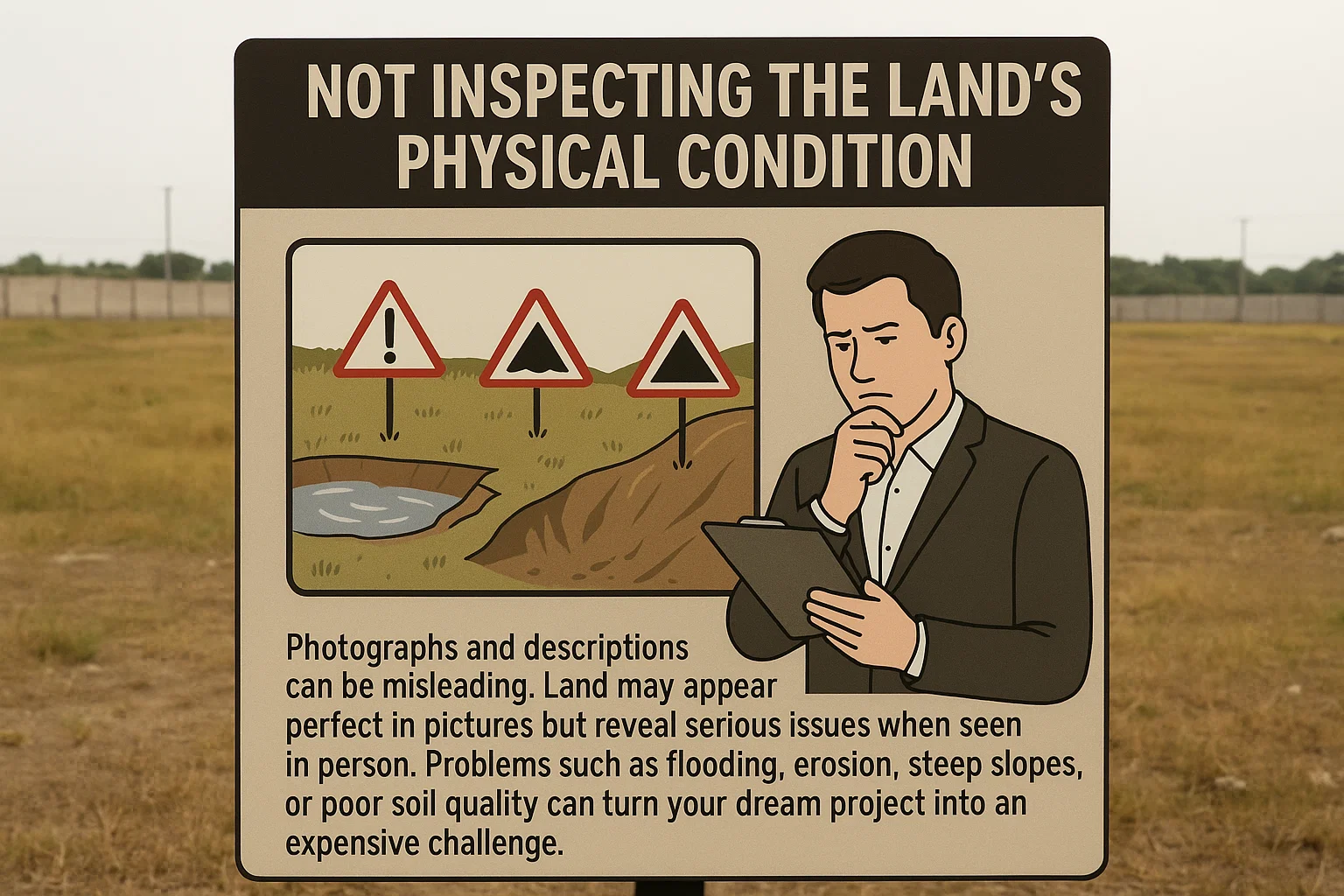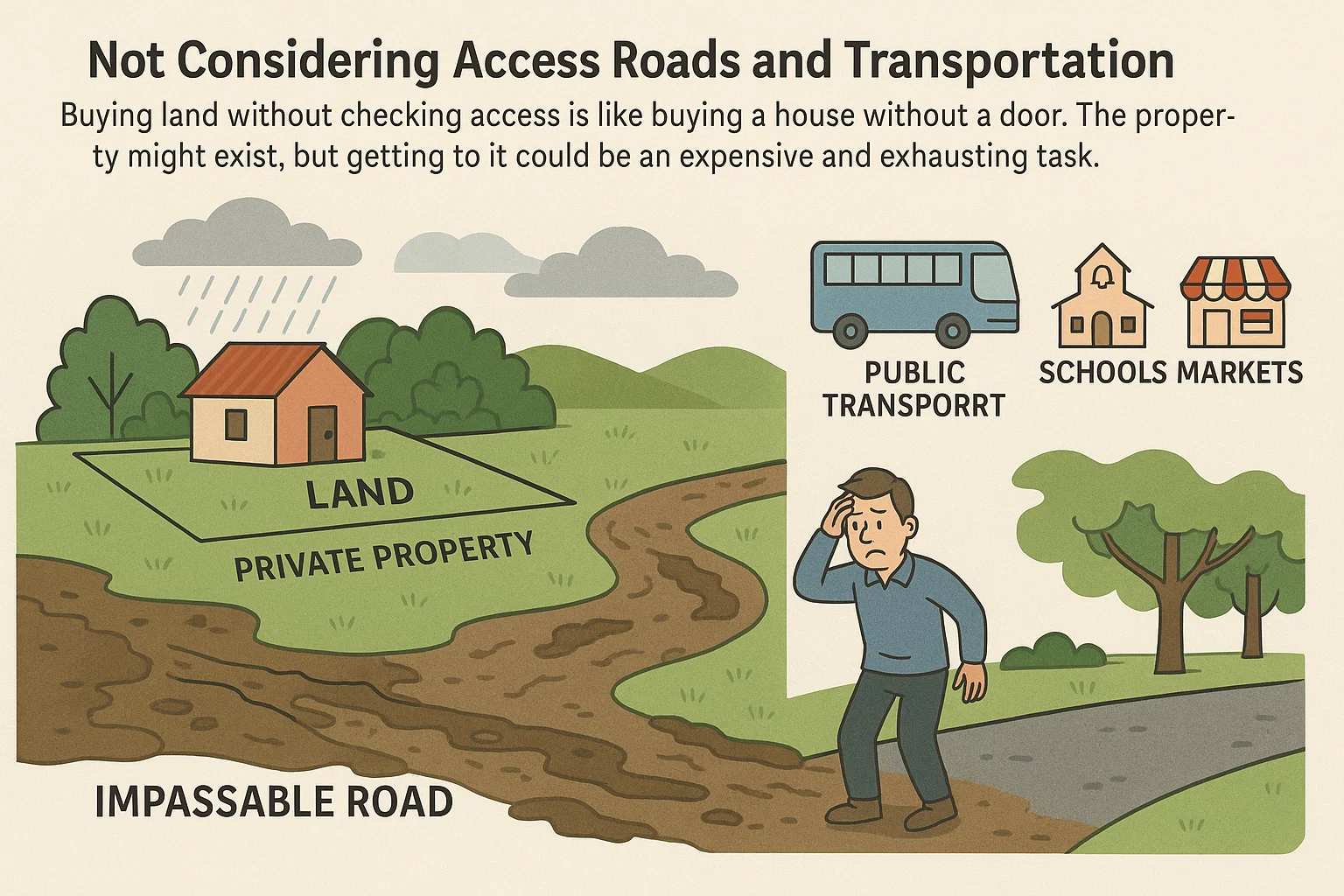Real Estate, Construction, House Plans
8 Mistakes People Make When Buying Land (and How to Avoid Them)
Buying land is one of those moments that feels both thrilling and intimidating. It is the kind of decision that can shape your future, whether you are planning to build a home, start a farm, or develop a business space. The thought of owning a piece of earth that is truly yours brings a sense of pride and possibility. But along with that excitement comes a set of challenges that many buyers are not prepared for.
You might have already heard stories from friends or relatives who bought land only to face unexpected problems. Some discover too late that the land is tied up in legal disputes. Others learn that the soil cannot support the type of construction they had in mind. A few find themselves stuck with property that is nearly impossible to access. These are real situations that can turn a dream investment into an expensive headache.
It is easy to understand why these mistakes happen. Land buying can look straightforward from the outside. You see a plot you like, agree on a price, and sign the papers. But beneath that simple process lies a complex web of legal, financial, and practical details. Missing even one step can lead to big losses.
Now imagine a different picture. You purchase land that is legally clear, perfectly suited to your plans, and free from unpleasant surprises. Every decision is based on facts, not guesswork. You know the value of what you are buying and you have the confidence that it will serve your goals for years to come. That kind of outcome is not only possible, it is the result of careful preparation and the right guidance.
This is where expert support becomes priceless. With the help of professionals who understand the land market inside and out, you can navigate the process with ease.
In this guide, we will walk through the eight most common mistakes people make when buying land. More importantly, you will learn exactly how to avoid them so that your land purchase becomes a foundation for success rather than a source of stress.
1. Not Researching the Land’s Legal Status
One of the most serious mistakes when buying land is failing to investigate its legal standing. Many buyers focus on the beauty of the location, the size of the plot, or the price being offered. They assume that if the seller is willing to sign, everything must be fine. Unfortunately, this assumption can lead to disaster.
Land ownership can be complicated. A piece of land might belong to several people through inheritance, meaning one family member could try to sell without the consent of others. There could be a pending court case over boundaries or past transactions. In some cases, the person selling may not be the true owner at all. Without proper checks, you could pay for a property that is later claimed by someone else, leaving you with a loss and a lengthy legal fight.
Another common issue is the presence of encumbrances. This means the land may be tied to an unpaid loan, tax arrears, or another form of debt. If you buy land with such problems, you may inherit the responsibility for settling those debts before you can take full possession. This can be financially draining and emotionally exhausting.
To protect yourself, always request the official title deed from the seller and verify it at the relevant land registry. This step confirms that the person selling is the rightful owner and that the property is free from disputes or restrictions. It is wise to also check the land’s history. This can reveal past transactions, transfers, or claims that might affect your ownership.
If you are not familiar with these processes, work with professionals who are. Land purchase professionals partner with qualified lawyers and licensed surveyors who perform detailed due diligence. They ensure that all documents are authentic, that the land is registered correctly, and that there are no hidden legal problems. This approach not only protects your money but also gives you peace of mind that your investment is secure.
Skipping a legal status check is like buying a locked box without knowing what is inside. It might contain treasure, or it might contain nothing but trouble. Taking the time to confirm the legal details before you pay ensures that what you buy truly belongs to you and that no one can challenge your rights to it in the future.
2. Ignoring Zoning Laws and Land Use Restrictions
Zoning laws decide how land can be used. They are not just bureaucratic rules on paper; they can completely determine whether your project becomes reality or remains a dream. Land is usually classified for purposes such as residential use, agriculture, commercial activity, or industrial development. If the land you buy is not zoned for your intended use, you may not be able to build what you planned, no matter how much you have already spent.
Imagine buying a beautiful plot thinking you will build a hotel, only to learn that the area is set aside exclusively for farming. The local authority will not approve your building plans, and you will be left with property that does not serve your purpose. This happens more often than many buyers realise, especially when they skip the step of checking the zoning category.
The risks do not end there. Zoning regulations can also control the height of buildings, the amount of land that must remain open, and the type of activities allowed in the area. Even if the current zoning works for you, future changes can alter the picture. A quiet residential area can be reclassified for commercial development, bringing traffic and noise that reduce the value of your property.
Before buying, visit the local planning office and request full information on the zoning classification and any upcoming changes. Land buying professionals help clients with these checks by liaising with planning officials and reviewing official maps and documents. This ensures you know exactly what you can do with the land and what restrictions you must follow.
Skipping zoning checks is like buying a boat without knowing whether there is water nearby. The land may look perfect, but if the law says you cannot use it for your intended purpose, your investment could become a costly mistake.
3. Overlooking Access to Utilities
Many buyers fall in love with a plot of land without thinking about how they will get water, electricity, internet, and waste management services. Without these essential utilities, even the best-located land can become difficult and expensive to develop.
Some rural or newly opened areas have no connection to the electricity grid or municipal water system. Extending power lines or laying water pipes over a long distance can cost a fortune and take months to complete. In certain locations, these services may not be available at all, leaving you with only costly alternatives like solar systems or water trucking.
To avoid unpleasant surprises, always ask whether the land already has utility connections. If it does not, find out how far away the nearest source is and what it will cost to connect. Remember to factor in the cost of permits, materials, and skilled labour.
Nyolenju Structures Limited advises clients to assess utility access before signing any contract. Their experts can arrange site inspections with utility providers to confirm availability and give realistic cost estimates for connection. This ensures you can plan your project budget accurately from the start.
Buying land without checking for utilities is like buying a car without an engine. It may look good from the outside, but it will not move you forward unless you invest more time and money to make it functional.
4. Not Inspecting the Land’s Physical Condition
Photographs and descriptions can be misleading. Land may appear perfect in pictures but reveal serious issues when seen in person. Problems such as flooding, erosion, steep slopes, or poor soil quality can turn your dream project into an expensive challenge.

A site visit is essential. Walk around the property and pay attention to natural features. Does the ground have standing water that might signal drainage problems? Is the slope too steep for your planned construction? Are there signs of soil erosion that could threaten stability?
Boundaries are another key factor. Without a physical inspection, you might discover later that a neighbour’s fence cuts into your property or that your land is smaller than you were told. This can lead to disputes that are costly and time-consuming to resolve.
A professional surveyor can identify these issues early. Nyolenju Structures Limited works with trusted surveyors who assess soil stability, drainage, and accurate boundaries. They provide detailed reports so you know exactly what you are buying.
Skipping this step is like buying a house without checking if the roof leaks. The problem may stay hidden at first, but it will surface later, bringing unnecessary stress and expenses.
5. Skipping a Proper Valuation
Many buyers agree to a seller’s price without checking whether it matches the market value. This is risky. You could overpay for land that is worth far less, or buy at a low price because the land has hidden problems that will cost more to fix later.
A valuation gives you an accurate picture of the land’s worth based on location, size, zoning, available infrastructure, and recent sales of similar plots in the area. It also helps you negotiate from a position of strength, as you will have solid evidence to support your offer.
Some buyers rely on guesswork or the advice of friends when setting a budget. While well-meaning, such advice is often based on outdated or incomplete information. Market conditions can change quickly, and only a trained valuer can give you an up-to-date and precise figure.
Buying land without valuation is like buying shares without checking the company’s financial health. You may get lucky, but you could also lose money if the numbers do not match the reality.
6. Forgetting About Future Development Plans
It is natural to focus on how the land looks today, but you must also consider how the area might change in the future. Nearby developments can either raise or lower the value of your land.
For example, a new highway can make your property more accessible, increasing its value. On the other hand, a large factory or noisy entertainment facility could make it less desirable for residential purposes.
Local authorities often have long-term plans for road construction, public facilities, and industrial zones. These plans are not always publicised widely, so you need to ask directly at the planning office.
Professionals help clients research these plans so they can make informed decisions. They review municipal records, attend planning meetings, and consult with local experts to uncover details that could affect your investment.
Ignoring future developments is like planting a garden without checking if the area will soon be paved over. A beautiful piece of land can quickly lose its appeal if the surroundings change in ways you did not expect.
7. Not Considering Access Roads and Transportation
A piece of land may be affordable and attractive, but if it is hard to reach, it will create endless problems. Poor roads can delay building materials, raise transport costs, and reduce the value of your investment.

Check if there is a legal right of way to the property. Some land is surrounded by other private parcels, which means you cannot access it without permission from neighbours. Even if there is a road, confirm whether it is passable in all seasons. A road that turns to mud during the rainy months can make your property practically unreachable for weeks at a time.
Proximity to public transport, schools, and markets also matters. Buyers often overlook these factors, only to regret it later when daily commuting or basic shopping becomes a challenge.
Buying land without checking access is like buying a house without a door. The property might exist, but getting to it could be an expensive and exhausting task.
8. Neglecting to Involve Experts Early
Many buyers believe they can save money by handling everything themselves. They may rely on verbal promises or incomplete information from the seller. Unfortunately, land transactions are complex and mistakes can be costly.
You may need a lawyer to verify ownership, a surveyor to check boundaries, and a valuer to confirm fair pricing. Without these experts, you could miss critical details that later turn into expensive problems.
Trying to buy land without expert help is like trying to perform surgery after watching a few videos. The risk of mistakes is simply too high, and the consequences can be severe.
Conclusion
Buying land is one of the biggest decisions you will ever make. It is also one of the most rewarding when done right. But without the proper checks, what seems like a great deal can quickly become a source of stress, wasted time, and financial loss. The mistakes we have discussed are common, yet every single one of them can be avoided with the right preparation and support.
This is where we come in. At Nyolenju Structures Limited, we take pride in guiding our clients through every stage of the land acquisition process. We do not just help you find land; we make sure it is the right land for your needs. Our team carries out detailed site analyses, including professional surveys to confirm boundaries, topography, and soil quality. We ensure you know exactly what you are buying before you commit a single shilling.
We also look beyond the purchase itself. Once you have secured your land, we provide house plans that are designed to fit the site perfectly. Our architectural team considers the slope, soil, climate, and surrounding environment to create designs that are both functional and beautiful. This means you can move from buying to building without the delays and frustrations that come from poor planning.
Our approach is simple. We combine legal checks, market research, and technical expertise to protect your investment. We take the stress out of the process by handling the complicated parts for you while keeping you informed at every step. With us as your partner, you can buy land with confidence and start your project on a strong foundation.
Your dream property is out there. Let us help you find it, secure it, and shape it into the space you have always imagined. We are here to make sure your land buying journey is safe, smart, and successful.

FAQs
1. What is the first step in buying land?
The first step is to confirm the legal ownership of the land. This involves conducting a title search at the land registry to ensure that the seller is the rightful owner and that the property is free from disputes or outstanding debts. You should never rely on verbal promises or photocopies of documents alone. At Nyolenju Structures Limited, we handle this process for our clients by working with legal experts who verify every document before any money changes hands.
2. How do I know if land is good for building?
Determining if land is suitable for building requires more than just looking at it. You need to consider soil quality, drainage, slope, and accessibility. A professional surveyor can carry out a site analysis to assess whether the land can support the type of construction you have in mind. We provide this service as part of our land acquisition support, ensuring you only invest in land that can be developed safely and efficiently.
3. Can Nyolenju Structures Limited help with land financing?
Yes. While we are not a bank, we have strong relationships with reputable lenders and financial institutions. We can connect you with financing options that suit your budget and project goals. We also guide you through the application process, ensuring you have all the necessary documents and valuations to improve your chances of approval.
4. How long does the land buying process take?
The timeline can vary depending on the complexity of the transaction, the speed of document verification, and any negotiations involved. In most cases, the process can be completed within 30 to 90 days if everything is in order. Our team works efficiently to keep delays to a minimum while ensuring no step is rushed or overlooked.
5. Should I visit the land before buying?
Absolutely. A site visit is essential to confirm that the land matches its description and to check for any physical issues such as flooding, erosion, or unclear boundaries. Pictures can be misleading, and only a physical inspection will give you the full picture. We arrange and accompany our clients on site visits, making sure they see both the strengths and potential challenges of the property before committing.

